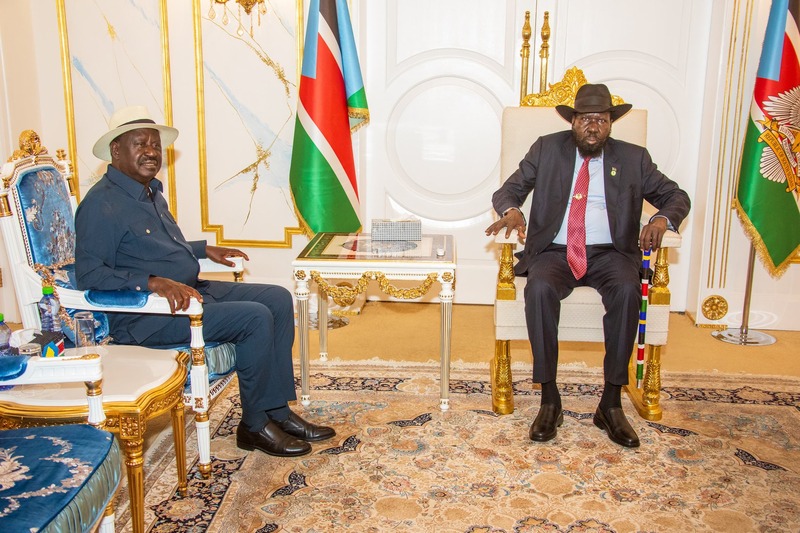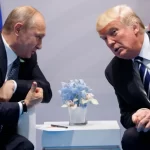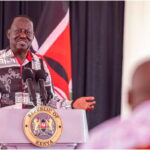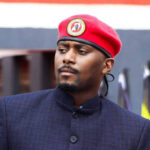The political situation in South Sudan took a dramatic turn on Friday when former Kenyan Prime Minister Raila Odinga, serving as a special envoy, was denied access to detained First Vice President Dr. Riek Machar during his diplomatic mission in Juba.
Odinga, who was tasked with assessing the crisis following Machar’s house arrest, was only permitted to meet President Salva Kiir, raising concerns about the deteriorating state of affairs in the fragile nation.
A One-Sided Diplomatic Mission
Odinga, a seasoned mediator in African conflicts, had been expected to engage both parties in the South Sudanese leadership crisis to ensure a balanced resolution. However, after meeting Kiir, he revealed that the government had barred him from speaking with Machar, who remains under heavy military guard at his residence.
“I asked to be allowed to talk to Dr. Machar, but they were not able to allow me to see him,” Odinga told journalists, emphasizing that engaging only one side of the dispute could hinder efforts to stabilize the country.
Instead of facilitating a meeting, Kiir advised Odinga to consult Uganda’s President Yoweri Museveni. “They recommended that I meet with President Museveni,” Odinga disclosed. However, Museveni, while acknowledging the concerns raised, did not offer a clear pathway to resolving the crisis but promised to speak with Kiir.
Machar’s Arrest Raises Fears of Peace Deal Collapse
The detention of Machar, who leads the Sudan People’s Liberation Army-In Opposition (SPLA-IO), has sent shockwaves across the country. The SPLA-IO warned that the move signaled the collapse of the 2018 peace agreement, which had ended years of brutal civil war and established the current unity government.
“The arrest of Machar is a direct violation of the peace deal. This is a sign that the unity government is on the verge of crumbling,” said a spokesperson for SPLA-IO.
On Friday, South Sudan’s Minister of Information, Michael Makuei, justified the arrest, claiming that intelligence reports implicated Machar in mobilizing his forces to stage a rebellion. “We have credible intelligence that Machar was planning to destabilize the country, and as a government, we had to act swiftly,” Makuei stated.
International Outcry and Calls for Machar’s Release
The arrest has triggered a strong response from international organizations and foreign governments. The United Nations, African Union, and several Western diplomatic missions—including those of the United States, United Kingdom, France, Germany, Norway, and the Netherlands—have demanded Machar’s immediate release and the restoration of the unity government.
UN Secretary-General António Guterres issued a direct appeal to President Kiir, urging him to uphold the 2018 peace agreement. “We call upon President Kiir to immediately release Dr. Machar and recommit to the peace process,” Guterres said in a statement.
The African Union (AU) also voiced its concerns, with AU Chairperson Mahmoud Ali Youssouf announcing the deployment of the AU Panel of the Wise, a conflict mediation body chaired by retired Kenyan Justice Effie Owuor.
“The African Union is committed to ensuring lasting peace in South Sudan, and we will work closely with all parties to find an amicable solution,” Youssouf stated.
Uganda’s Military Presence in South Sudan
Complicating the situation further, Uganda deployed its military forces to South Sudan on March 11, following a request from President Kiir. The Ugandan People’s Defense Forces (UPDF) presence has raised speculation about regional involvement in the crisis, with critics arguing that Uganda’s intervention could tilt the balance of power in favor of Kiir’s government.
Regional and Global Implications
The crisis in South Sudan has far-reaching implications beyond its borders. If not resolved, renewed conflict could trigger a humanitarian disaster, displacing thousands and worsening food insecurity. South Sudan, the world’s youngest nation, has already suffered through years of civil war, which have devastated its economy and infrastructure.
Moreover, the political instability could strain relations within the Intergovernmental Authority on Development (IGAD), the regional bloc that has been instrumental in previous mediation efforts. IGAD had played a crucial role in brokering the 2018 peace deal, and Odinga’s mission was seen as part of its renewed efforts to prevent further conflict.

What Next for South Sudan?
With mounting international pressure, the coming days will be critical in determining South Sudan’s path forward. The question remains: will Kiir heed calls for Machar’s release and engage in dialogue, or will tensions continue to rise, pushing the country further into turmoil?
As Raila Odinga continues his diplomatic engagements, all eyes are now on Uganda’s President Museveni and regional leaders to mediate a solution before the crisis spirals out of control. The fate of South Sudan’s fragile peace now hangs in the balance.








